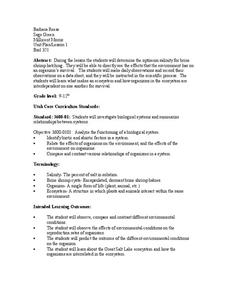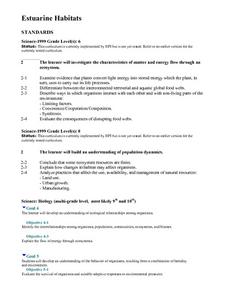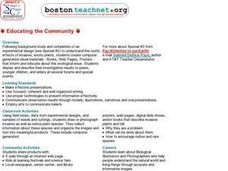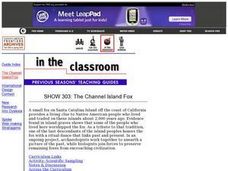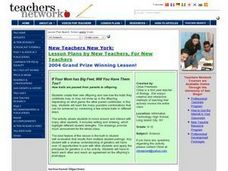Curated OER
Mountains in the Sea Exploration No Escape
High schoolers study data to hypothesis about the influence of a water circulation cell on the retention of benthic invertebrate larvae in the area of a seamount. They investigate the positives and negatives of larvae retention in this...
Curated OER
Hatching Brine Shrimp
Third graders investigate the environment that is considered favorable for brine shrimp hatching. The salinity level is of particular interest in the observations because the optimum level is needed for survival. They make daily...
Curated OER
Water Quality
Students play the role of scientists testing for water quality in the area. In this ecology lesson, students determine the water sample's pH, temperature, dissolved oxygen and turbidity. They write a journal reflection after the activity.
Curated OER
Desert Xeriscaping
Seventh graders identify native species of desert vegetation, plan a xeriscape landscape, and recognize the importance of water conservation.
Curated OER
Head to Foot
Students describe the body form and major anatomical structures of squids and describe some unusual or unique features of newly-discovered deep water squid species. They infer what types of food squids use from their anatomical features.
Curated OER
the Wonder of Wetlands
Young scholars explore the importance of the wetland ecosystem, its properties and functions, as well as, the many birds, animals, and plant life found there.
Curated OER
Lotic Environment
Students assemble a classroom river model as an example of a lotic system. They control and measure biotic and abiotic information for the in-class system and compare data with a lotic system in a natural environment.
Curated OER
Estuarine Habitats
Sixth graders study the important habitats, flora, fauna, and physical factors of coastal habitats. They compare the aquatic habitats to terrestrial habitats by researching and completing tables with the information.
Curated OER
Desert Xeriscaping
Students recognize native species of desert vegetation while examining the need for water conservation. They design and create a xeriscape landscape using a variety of materials.
Curated OER
Educating the Community
Students research the effects of invasive and exotic plants. They create posters, webpages and books to educate the community. They present their material in different forums.
Curated OER
Toxicology 2: Finding the Toxic Dose
Students brainstorm with group partners to decide upon a chemical they would like to test, and outline a procedure for their investigation. They then present in groups their ideas to the rest of the class as well as the chemical they...
Curated OER
Biome Exchange: Send the Stuff Not The Kids
Learners exchange information with students from various geographic biomes. They explore the unique ecologically significant features of the biomes and share with other learners.
Curated OER
Food Type And Calories Per Square Meter
Young scholars compare the efficiency of producing food calories in different types of food then calculate how much land is required to supply their food for a year. They then graph the results.
Curated OER
Lotic Environment Lesson Plans
High schoolers create and conduct experiments on a "classroom river habitat." They manipulate the biotic and abiotic factors so that they are able to compare an artificially prepared river model to a naturally occurring lotic ecosystem.
Curated OER
SHOW 303: The Channel Island Fox
Students explore how archaeologists and other scientists use different clues to piece together a picture of the past. Students perform activities that allow them to conduct three types of scientific research. They discuss their...
Curated OER
Smog Be Gone
Students begin the lesson by identifying greenhouse gases. In groups, they observe and record the effect of the gases on the atmosphere and the temperature of the Earth. They participate in activities that describe the role of...
Curated OER
If Your Mom Has Big Feet, Will You Have Them Too?
Students describe and apply the Mendellian principles of genetics, focusing predominantly on dominant and recessive genes. They demonstrate how two parents contribute genes and how those genes appear in their offspring. They describe...
Curated OER
Goobers. Goobers? Goobers!
Learners begin the lesson by noting the many ways in which to use peanuts. In groups, they use the internet to research the work of George Washington Carver. They discover the allergies and nutritional information of the peanut and...
Curated OER
Pulling Together With Natives -- The Bradley Sisters' Story
Students identify the four ways to stop the spread of weeds in California. In groups, they practice the five methods of removing and controling the spread of the weeds. To end the lesson, they summarize the Bradley sisters way of...
Curated OER
Butterfly Lesson
Students identify that Idaho is a home to 168 species of butterflies and they are an important part of many habitats. They also identify how to use the Digital Atlas of Idaho and write a report regarding information of their assigned...
Curated OER
Water Quality Survey: Monitoring the Sustainability of Pigeon Creek
Students research the History of Pigeon Creek (or any watershed in your area). In this environmental science lesson, students conduct field tests such as pH and nitrates. They collect data and compare what they collected with other groups.
Other popular searches
- Plant Biology Photosynthesis
- Grade 11 Plant Biology
- Plant Biology Projects
- Plant Biology Leave
- Plant Biology Flowers
- Plant Biology Vocabulary
- Plant Biology Unit Plans
- Plant Biology Healthy Plants
- Plant Biology Powerpoint's
- Plant Biology Seeds
- Plant Biology Powerpoints
- Plant Biology Regeneration



